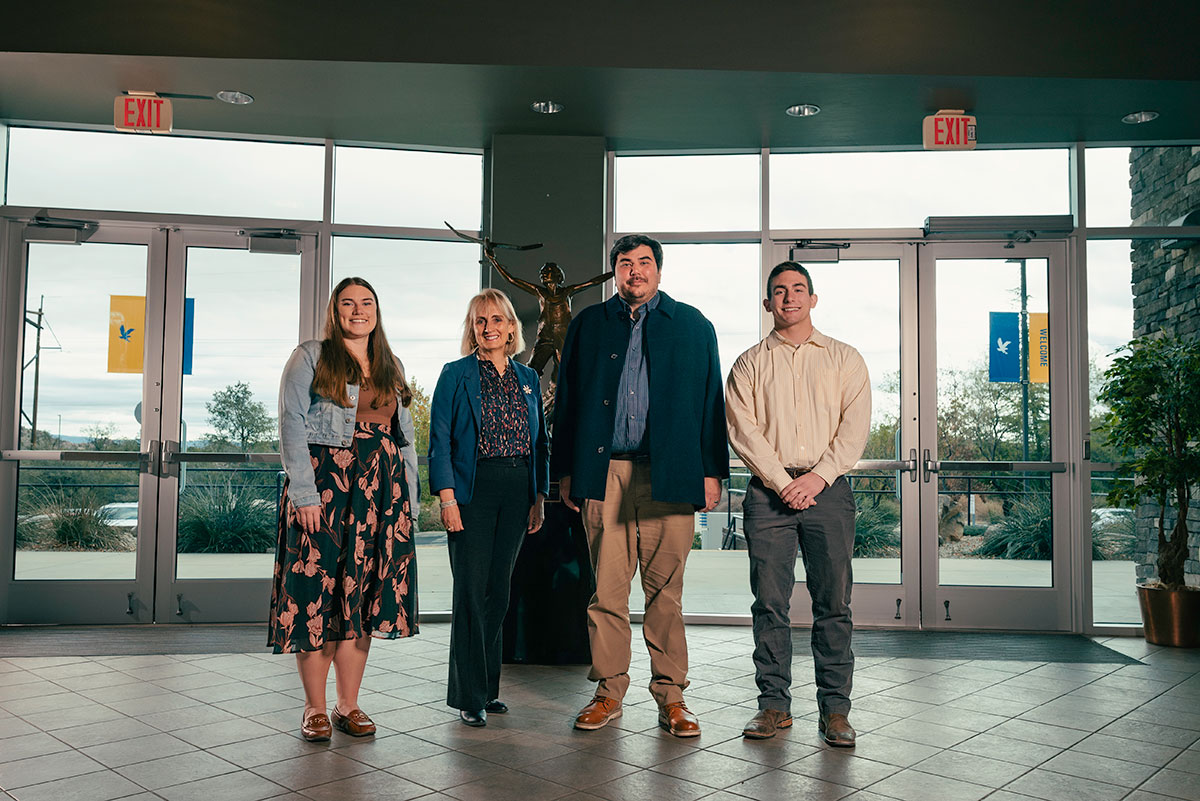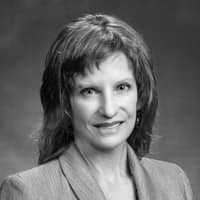Embry-Riddle’s Prescott Campus Celebrates 45 Years of Community Contributions

Since its inception 45 years ago, achievements and contributions of Embry-Riddle Aeronautical University’s Prescott, Arizona, campus have ranged from the university’s economic impacts statewide to student volunteer service hours and high-achieving alumni who are bolstering the aviation and aerospace workforce.
In the last year alone, Embry-Riddle students, known as “Eagles,” contributed more than 6,000 hours of volunteer service to the community, Interim Dean of Students Lee Wilkerson reported. Cadets in the Air Force Reserve Officers Training Corps at Embry-Riddle completed another 703 hours of service.
“Volunteer service projects included helping with a Wounded Warrior golf tournament fundraiser, Veterans’ Day activities, a Relay 4 Life event and pitching in to clean up local trails and highways,” Wilkerson said.
In addition, Embry-Riddle’s Prescott-based fraternity and sorority chapters raised nearly $12,000 for charitable causes. More than $2,000 helped support Feeding America, a nonprofit that combats hunger. Embry-Riddle’s Student Veterans Organization made a $1,000 donation to support prisoners of war and those missing in action, as well as a $600 donation for the AZ Oncology Breast Cancer Center, through their Remember Everyone Deployed (RED) Friday BBQs.
“Embry-Riddle has given me the opportunity to give back in ways I would never be able to before,” said Embry-Riddle student Colby Kroedel, philanthropy chair for Sigma Chi. “It makes me happy to see the diverse communities that we can impact with our time and energy.”
Over the years, Eagles have also brought science, technology, engineering and mathematics (STEM) activities to local youth. As an example, experimentation kits were provided to the Prescott Public Library by Embry-Riddle students to help children learn about the chemistry of slime, rockets and aviation. Eagles affiliated with the Society of Hispanic Professional Engineers have launched rockets at a middle school in Prescott Valley as a way to help spark young people’s interest in STEM.
Economic Impacts
Embry-Riddle’s Economic Impacts in Arizona, as of 2020
- Total Economic Impact - $392M
- Fiscal Revenues - $46M
- Household Income Generated - $138M
- Permanent Jobs for Arizona Residents - 3,000
Student volunteer hours aren’t Embry-Riddle’s only contribution to the community.
Across Arizona, Embry-Riddle’s total economic impact as of 2020 was $392 million — an increase of 41% since 2016 — and the university supported 3,000 permanent jobs for state residents — 38% more than four years earlier, according to an independent study by the Washington Economics Group (WEG).
Embry-Riddle also accounted for more than $46 million in fiscal revenues in Arizona in 2020, and the university was cited as a significant generator of household income — producing close to $138 million statewide (41% higher than in 2016).
The spending power of graduates of Embry-Riddle generated $86 million in total economic activity in Arizona in 2020, the WEG reported.
In Yavapai County, specifically, the university serves as a major and essential economic driver to the community; the university supported 2,853 jobs and $318 million in total economic impacts as of 2020. Further, Embry-Riddle’s activities added $173 million to Yavapai County’s GDP.
The WEG estimated that the cumulative economic impacts of Embry-Riddle’s capital spending plans in Arizona would have total economic impacts of $161 million and create 181 jobs between fiscal years 2021 and 2025.
Building Workforce Capacity
With the airline industry facing a global shortage of highly trained pilots, Embry-Riddle is working to bolster workforce capacity. Demand has been strong for the university’s well-respected flight-training program: Between fall 2018 and fall 2023, for example, the number of Aeronautical Science students at the Prescott Campus increased from 486 to 994.
Mark Pryor, a 1982 Embry-Riddle graduate and airline captain, was one of 268 Aeronautical Science students in the first-ever incoming class at Embry-Riddle’s Prescott Campus, where students can pursue degrees in Fixed Wing or Rotary Wing flight. Pryor is one of more than 4,000 students who have earned a B.S. in Aeronautical Science from the campus since 1980.
“I built a 40-year flying career, both in the United States Air Force and as a Delta Captain, based on the training I received at Embry-Riddle,” he said. “I know many more Eagles will follow in my footsteps.”
Other accomplished alumni of the Prescott Campus include Capt. Pablo Bartlett of American Airlines and Capt. Rob McCall of United Airlines.
The U.S. Assistant Secretary for Tribal Affairs, Arlando Teller, earned a bachelor’s degree in Aviation Business Administration from Embry-Riddle-Prescott in 1995. Janet Grondin, a 1989 graduate, is now CEO of Stellar Solutions, an engineering firm, following a 26-year career in the Air Force, where she helped overhaul the GPS ground system and the early stages of the Delta IV rocket program.
The winner of a “genius award” from the MacArthur Foundation, astrodynamicist Moriba Jah, a 1999 Prescott Campus graduate, served in the U.S. Air Force before joining NASA’s Jet Propulsion Laboratory, the Air Force Research Laboratory and the University of Texas at Austin.
Looking to the Future
To ensure that the Prescott Campus remains at the forefront of aviation education, Embry-Riddle has invested in a dramatically modernized flight training center, which is expected to debut in summer 2024, followed by a new airport complex and other improvements.
Soon, the two-story Robertson Flight Simulation Center (also known internally as F7) will provide 16,000 square feet of space for simulator practice and other student activities, plus a room to add a full-motion simulator bay. That project — a $9.2 million investment approved by Embry-Riddle’s Board of Trustees — will ensure that the scenic Prescott Campus remains a premier flight training location.
From fiscal year 2020 through FY22, Embry-Riddle has invested approximately $22.4 million in new aircraft and simulators for the Prescott Campus, and over the next three years, the university will invest another $34.4 million, said Embry-Riddle’s Chief Financial Officer and Senior Vice President Dr. Randy Howard.
In addition to flight center upgrades, Embry-Riddle is working to double aircraft capacity by establishing a new Strategic Academic Flight Education (SAFE) Complex, to be located on the north side of Prescott Regional Airport. Phase I of the SAFE project should be completed by January 2025.
“The future looks bright for Embry-Riddle’s Prescott Campus and for our graduates,” said Dr. Anette M. Karlsson, Prescott Campus chancellor. “Thanks to all who are making our most ambitious goals a reality at Prescott.”
Fulfilling a Vision
Embry-Riddle’s Prescott Campus was originally envisioned by the late Jack Hunt — who served as president of Embry-Riddle from 1963 until 1984 — more than three decades before current President P. Barry Butler, Ph.D., joined the university in 2017.
Back in the 1970s, as Hunt announced the new campus location to City of Prescott officials, he said, “I believe that the most exciting thing about aviation is the future. I want to see where we’re going, and I want to ask you to help us get there.”
Today, continuing contributions by the Prescott Campus “remind us of our long history and our ability to provide students with safe, efficient flight training and an exceptional STEM education, to prepare them for high-paying careers in many different fields,” Karlsson said. “Embry-Riddle excels at producing well-trained professional pilots who are adept decision-makers and leaders. We are also educating top-notch scientists and engineers as well as business and cybersecurity professionals.”
Embry-Riddle has two residential campuses — one in Prescott, the other in Daytona Beach, Florida — as well as a Worldwide Campus, which administers its virtual programs. The university serves more than 31,000 students around the globe.

 Ginger Pinholster
Ginger Pinholster